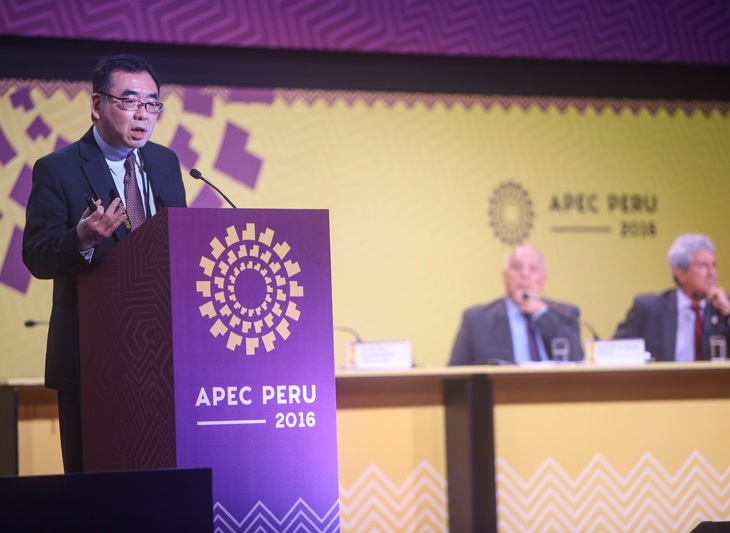Report: New Sources of Growth Vital as Trade Falters

A disturbing two-year slowdown in trade-driven growth in APEC, the world’s largest regional economic group, could be a preview of things to come as souring perceptions of globalization lead towards an outbreak of protectionism.
This is the warning sounded by the latest APEC Regional Trends Analysis issued ahead of pivotal economic policy meetings of the region’s Leaders and Ministers this week in Lima. It calls upon them to do more to widen participation in trade to ease concerns about fairness and growth.
Merchandise imports and exports in the 21 APEC member economies continue to underperform, contracting 6.6 per cent and 6.4 per cent, respectively, during the first eight months of the year due to weak global demand, the report reveals.
“Continued sluggish trade has moderated growth in APEC to 2.4 per cent, igniting the pursuit of new sources of growth,” said Dr Alan Bollard, Executive Director of the APEC Secretariat. “A top priority is opening up trade and supply chains to small firms that employ most of the region’s workforce but do business across borders in quite modest numbers.”
“APEC is heavily focused on enabling micro, small and medium enterprises to modernize and trade goods and services more easily and at lower cost,” he explained. “A big part of this is establishing conditions that support the more prolific use of mobile technology and e-commerce to connect with international buyers and sellers.”
The report indicates that new trade opportunities abound in the region, bolstered by household consumption and the effect of low interest rates and prices of commodities, particularly oil, on spending habits. But it cautions that uneven growth among economies, interest rate shifts and protectionism pose near-term risks.
“While tariffs across APEC remain low at around 5 per cent, trade-restrictive measures have increased and trade-facilitating measures have declined in the region,” noted Dr Denis Hew, Director of the APEC Policy Support Unit—the research body which authored the report.
“A move away from globalization and free trade threatens to unleash greater protectionism that would hurt consumers, close off trade for small businesses and further weigh on growth,” he added. “Work in APEC to better prepare workforces to adapt to economic and technological change could help to buoy employability and confidence in the trading system.”
The report advocates education reform and the introduction of measures that improve career training and skills development compatible with digital innovation and labor market requirements as new industries take shape. This includes access to lifelong learning which is becoming more urgent as workforces age in many of the region’s economies.
Labor market and social insurance policies must also consider digital jobs increasingly characterized by freelance work with multiple clients that may be located across international borders, the report states. Regional cooperation and policy coordination will be essential to manage the cross-border impacts of digital technologies, it adds.
Click here to download the latest APEC Regional Trends Analysis
# # #
For further details, or to arrange possible media interviews, please contact:
David Hendrickson (in Lima) +65 9137 3886 at [email protected]
Michael Chapnick (in Lima) +65 9647 4847 at [email protected]
More on APEC meetings, events, projects and publications can be found on www.apec.org. You can also follow APEC on Twitter and join us on Facebook and LinkedIn.

